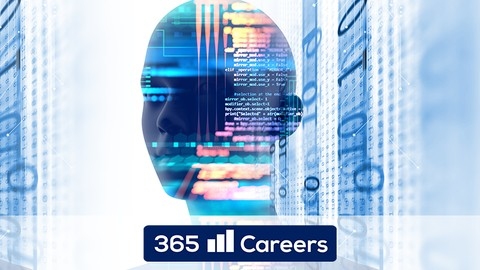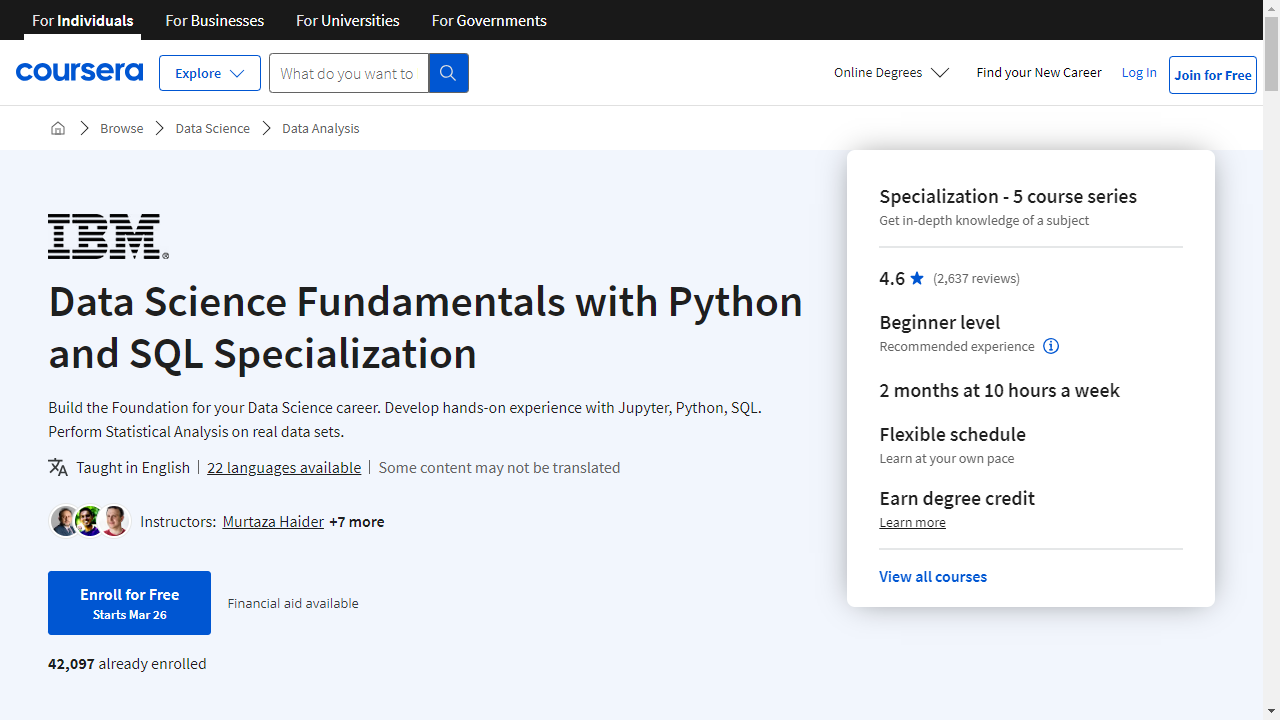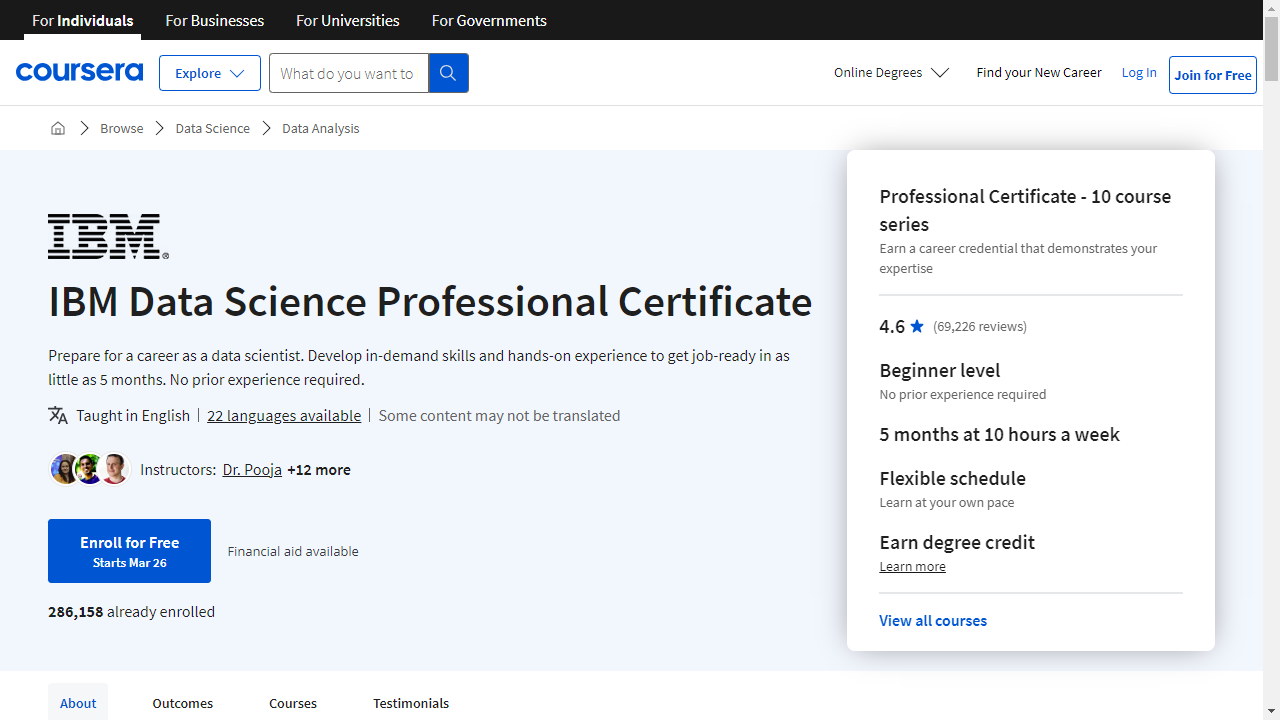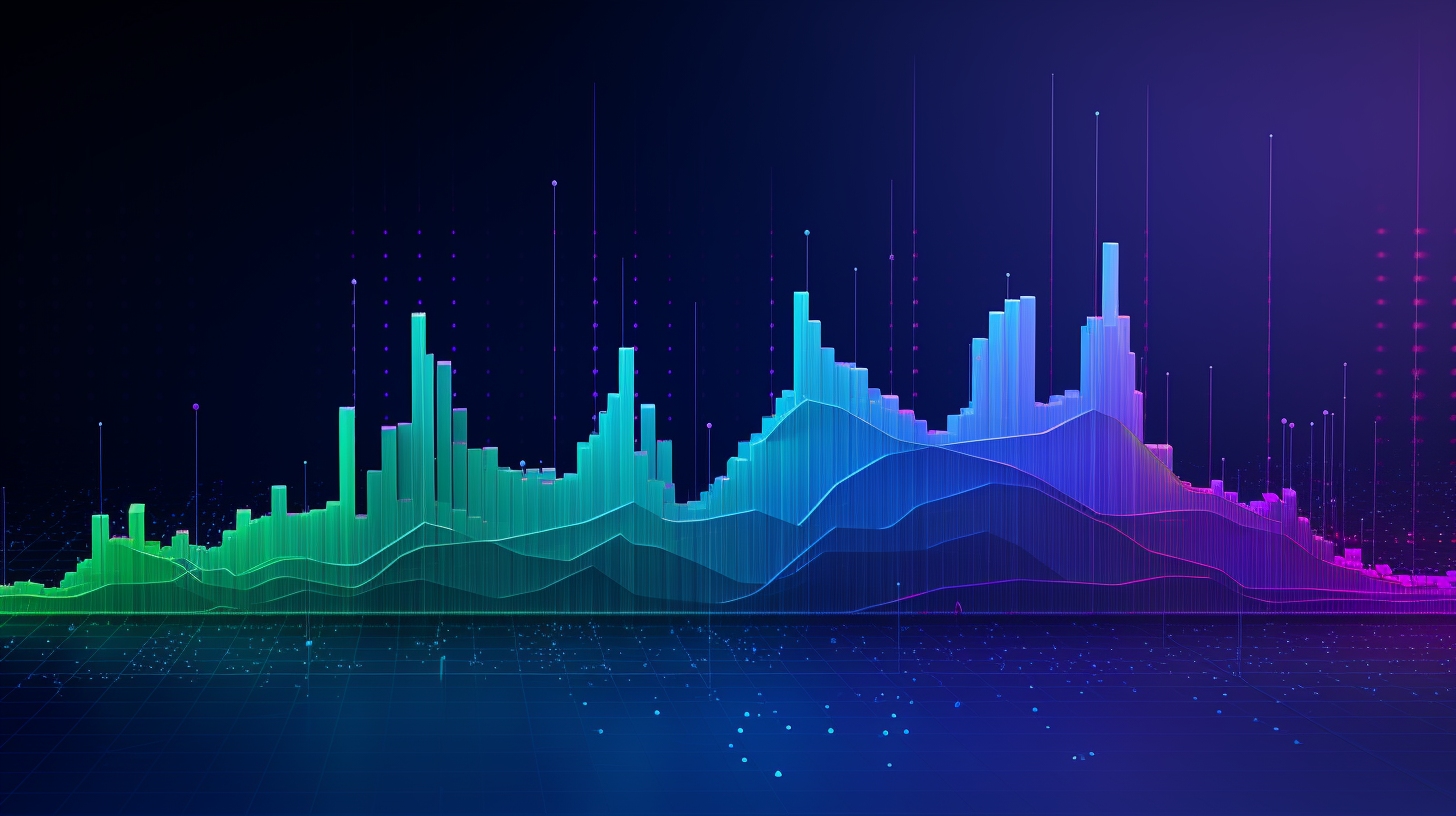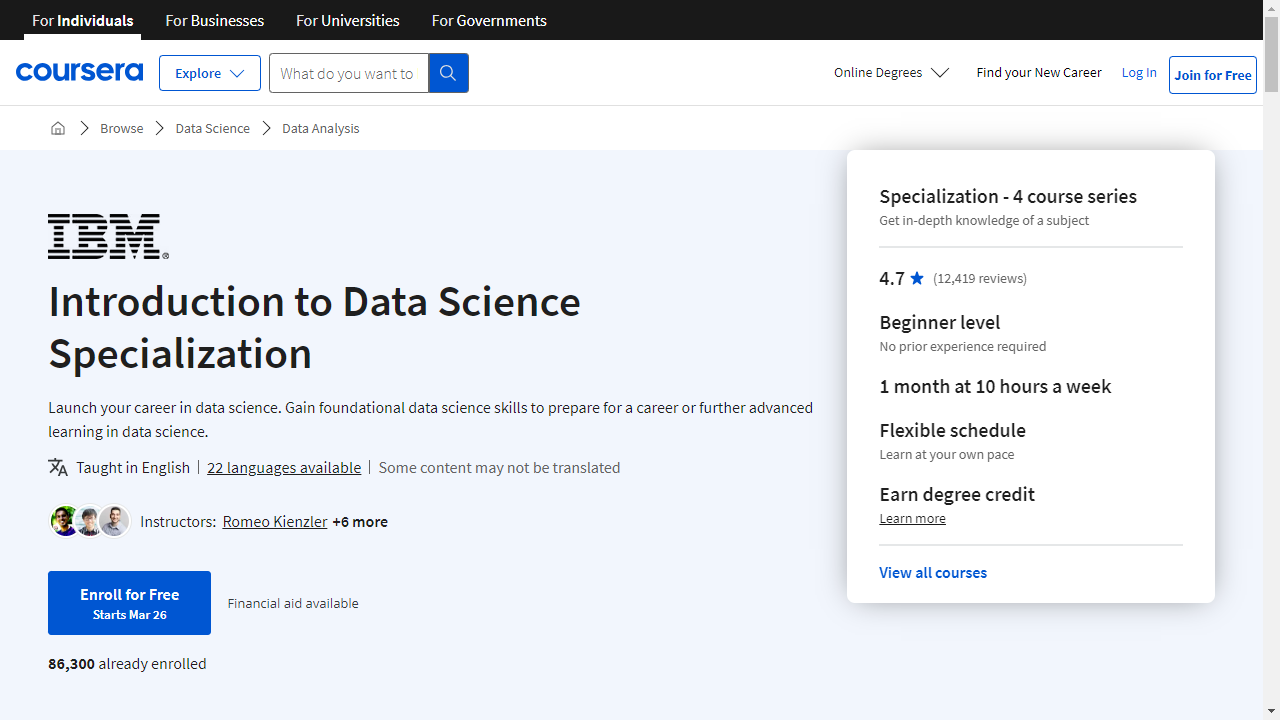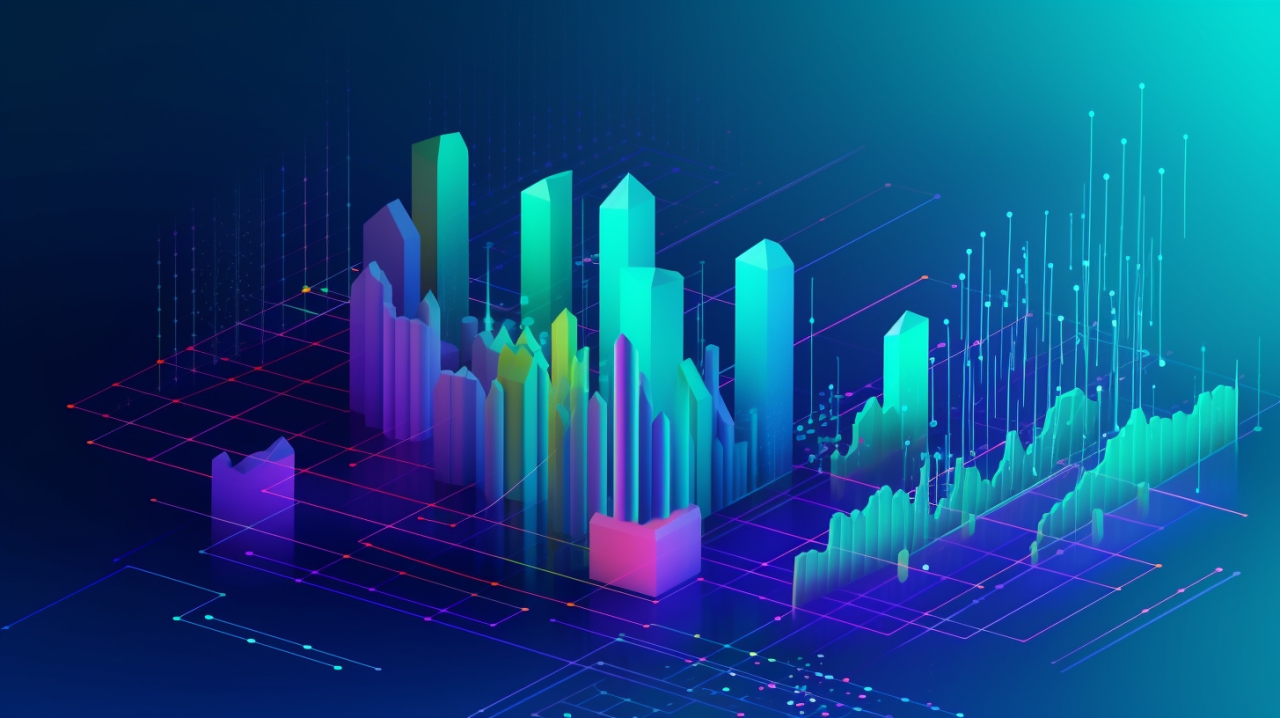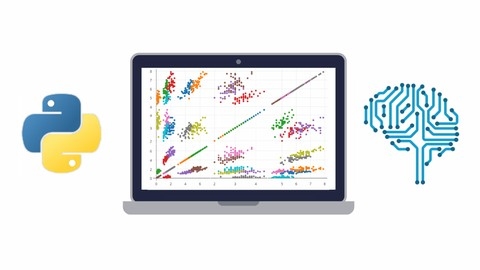Data science is a rapidly growing field that combines statistical analysis, programming, and domain expertise to extract insights and knowledge from data.
Data scientists are in high demand across various industries, as organizations increasingly rely on data-driven decision-making to gain a competitive edge.
By learning data science, you can unlock a world of opportunities in fields like machine learning, artificial intelligence, and business analytics, empowering you to solve complex problems and drive innovation.
Finding a comprehensive and well-structured data science course can be challenging, given the abundance of options available online.
You’re looking for a course that covers the essential concepts and techniques, provides hands-on experience with real-world datasets, and is taught by experienced instructors who can guide you on your learning journey.
For the best data science course overall, we recommend The Data Science Course: Complete Data Science Bootcamp 2024 on Udemy.
This comprehensive bootcamp offers a deep dive into the fundamentals of data science, covering topics like Python programming, statistics, machine learning, and deep learning.
With its practical approach, real-world projects, and engaging learning materials, this course is an excellent choice for aspiring data scientists.
While this is our top recommendation, there are other excellent data science courses available that cater to different learning styles and preferences.
Whether you’re a beginner or an experienced professional looking to enhance your skills, keep reading to discover more options and find the perfect course to launch your data science career.
The Data Science Course: Complete Data Science Bootcamp 2024
Provider: Udemy
This data science bootcamp provides a comprehensive and practical learning experience.
You will begin by exploring the different areas within data science, understanding how they interconnect, and uncovering the advantages of each.
You will build a strong foundation in probability, delving into concepts like combinatorics, Bayesian inference, and various probability distributions.
You will gain a solid understanding of statistics, covering both descriptive and inferential methods.
You will learn to describe data using measures like mean, median, mode, variance, and standard deviation, and you will dive into techniques like hypothesis testing and confidence intervals to draw meaningful conclusions from data.
The course introduces you to the power of Python programming, equipping you with the essential skills to manipulate and analyze data.
You will master Python syntax, learning about variables, data types, operators, conditional statements, functions, and different data structures like lists, tuples, and dictionaries.
You will explore advanced Python tools and libraries, including object-oriented programming principles, modules, and packages like NumPy and pandas, essential for data science tasks.
You will dive into the world of advanced statistical methods in Python, learning how to build and interpret linear and logistic regression models and perform cluster analysis using the K-Means algorithm.
You will explore techniques to improve your models, understanding concepts like feature selection, overfitting, and underfitting.
You will then delve into the exciting field of deep learning, starting with the fundamentals of neural networks.
The course will guide you through the process of building and training neural networks from scratch using NumPy, and you will be introduced to TensorFlow 2.0, a powerful library for deep learning.
You will apply your deep learning knowledge to real-world examples, such as classifying handwritten digits using the MNIST dataset, and explore popular deep learning architectures like CNNs and RNNs.
Data Science Fundamentals with Python and SQL Specialization
Provider: Coursera
This data science specialization equips you with the essential tools and knowledge to kickstart your data science journey.
You’ll begin by mastering popular tools like Jupyter Notebooks, RStudio, and Git, gaining a hands-on understanding of their applications and capabilities.
Next, you’ll delve into the world of Python, learning the fundamentals of this versatile language, from data types and structures to logic concepts.
You’ll become proficient in using libraries like Pandas, Numpy, and Beautiful Soup, enabling you to manipulate data, perform web scraping, and work with APIs.
You’ll then put your Python skills to the test in a real-world project, taking on the role of a data scientist tasked with analyzing data, extracting insights, and creating visualizations.
This project allows you to apply your knowledge and showcase your abilities in a practical setting.
A deep dive into statistics provides you with the tools for data analysis.
You’ll learn about data gathering, descriptive statistics, data visualization, and essential statistical concepts like hypothesis testing, regression, and correlation analysis.
Through Python and Jupyter Notebooks, you’ll gain practical experience in applying these methods.
Finally, you’ll master SQL, the language for communicating with databases.
You’ll learn to write queries, filter data, and work with database structures.
You’ll explore advanced concepts like JOINs and stored procedures, gaining a comprehensive understanding of database management.
This specialization culminates in a final project where you’ll analyze real-world datasets using your SQL skills.
Data Scientist Nanodegree
Provider: Udacity
The Udacity Data Scientist Nanodegree equips you with the skills needed to excel in the world of data science.
You start with the fundamentals, then move on to more advanced concepts.
You learn how to design experiments, build recommendation systems, and create data pipelines using tools like Python, SQL, and Spark.
You gain hands-on experience working with real-world data and popular tools.
You’ll become proficient with Pandas, NumPy, and Jupyter Notebook, while diving deep into machine learning, artificial intelligence, and data engineering.
You’ll explore essential techniques, including working with Python libraries like TensorFlow and PyTorch.
Udacity also ensures you understand important skills like web development and software engineering, which are crucial for building your own data science projects.
A highlight of the program is the capstone project.
In this project, you apply everything you’ve learned to tackle a real-world data science problem.
Throughout the Nanodegree, you will learn from expert instructors such as Judit Lantos, a Senior Data Engineer at Netflix, and David Drummond, VP of Engineering at Insight Data Science.
This guidance ensures you’re on the right track and are fully prepared to launch a successful data science career.
IBM Data Science Professional Certificate
Provider: Coursera
This IBM Data Science Professional Certificate will take you from the very beginning to an advanced level, perfect if you want a career in this exciting field.
You’ll start by understanding what data science is all about, why it’s so important today, and what kinds of jobs you can get.
You’ll then learn to use the same tools that data scientists use every day.
This includes powerful software like Jupyter Notebooks and RStudio IDE, along with essential programming languages like Python and SQL.
You’ll also master Git and GitHub, crucial tools for managing your code and collaborating with others.
But it’s not just about tools – you’ll also develop your data science thinking.
You’ll learn about the CRISP-DM methodology, a step-by-step process that helps data scientists solve real-world problems.
You’ll learn how to clean, prepare, analyze, and visualize data to uncover hidden patterns and trends.
Plus, you’ll build machine learning models using algorithms like K-Nearest Neighbors, Decision Trees, and Logistic Regression, even using Python libraries like SciPy and scikit-learn.
Finally, you’ll put all your skills to the test in a realistic capstone project.
You’ll work with data from SpaceX rocket launches to try and predict their success, applying everything you’ve learned to a real-world challenge.
This project isn’t just about passing a course – it’s about building a portfolio that shows potential employers what you can do.
Data Analyst Nanodegree
Provider: Udacity
This course equips you with the practical skills needed to thrive as a data analyst.
You’ll master industry-standard Python libraries like Pandas and NumPy, the bedrock of data manipulation and analysis.
You’ll learn to navigate the world of messy data, cleaning and exploring it to uncover those “Aha!” insights.
Imagine transforming raw data into insightful visualizations using Matplotlib and Seaborn – you’ll learn to tell compelling data stories that make an impact.
This Nanodegree goes beyond the theoretical.
You’ll gain hands-on experience working with real-world datasets, learning how to gather, assess, and clean data effectively.
You’ll even dive into machine learning, using algorithms to make predictions from data.
Picture yourself using Jupyter Notebooks, a powerful environment favored by data scientists worldwide, to analyze and interpret complex datasets.
You’ll learn from seasoned professionals like Josh Magee, a Senior Data Scientist with a background in nuclear physics, and Ria Cheruvu, an AI Software Architect at Intel with a passion for AI ethics.
This Nanodegree also understands that landing your dream job requires more than technical skills.
That’s why it includes a dedicated career services module.
You’ll learn how to optimize your LinkedIn and GitHub profiles, showcasing your expertise to potential employers and building your professional network.
Think of it as your launchpad into the exciting world of data analysis.
Tableau A-Z: Hands-On Tableau Training for Data Science
Provider: Udemy
This Tableau course begins by familiarizing you with the platform, guiding you through installing the software and connecting to common data files like CSV files.
You’ll start by crafting your first bar chart and learn how to leverage calculated fields.
These fields allow you to manipulate data to uncover meaningful insights, like identifying top performers for annual rewards based on performance metrics.
You’ll also master adding colors, labels, and formatting to enhance the visual appeal of your charts.
The course then delves into time-based data, showing you how to work with data extracts for quicker analysis.
You’ll grasp the concept of aggregation, enabling you to analyze data at different granularities, and create compelling area charts with highlighting features.
You’ll then explore filters and quick filters to effortlessly drill down into specific data segments and uncover hidden patterns.
As you progress, the course introduces maps, scatterplots, and the art of dashboard creation.
You’ll learn to build maps using geographic data, understanding the differences between relationships and joins to combine data from multiple sources.
You’ll then master creating scatter plots and applying filters across multiple worksheets.
Finally, you’ll combine your visualizations to build interactive dashboards for comprehensive data exploration.
You’ll also discover how to blend data, create custom territories, and unlock the potential of parameters for dynamic, user-driven dashboards.
You’ll even learn how to build compelling storylines within Tableau, allowing you to effectively communicate your data insights and findings.
Introduction to Data Science Specialization
Provider: Coursera
You want to know why data science is so popular?
This specialization on Coursera will show you exactly why.
This course starts with “What is Data Science?”, teaching you the basics and showing you how data science is used in the real world.
You’ll even get advice from experienced data scientists.
“Tools for Data Science” is where you’ll learn to use the tools data scientists use every day.
You’ll master tools like Jupyter Notebooks and RStudio, and even build your own project to share.
You’ll gain experience with important programming languages like Python and R along the way.
Want to think like a data scientist? “Data Science Methodology” will teach you how.
You’ll learn two important methodologies, Foundational Data Science Methodology and CRISP-DM, and use them to analyze real-world examples.
You will even use Jupyter Notebooks and Python to practice your skills.
Finally, “Databases and SQL for Data Science with Python” dives into SQL, a powerful language for working with databases.
You’ll start with the basics and work your way up to advanced techniques.
You will practice building SQL queries and analyzing real-world datasets.
Data Science for Business Leaders Nanodegree
Provider: Udacity
This Udacity Nanodegree program, “Data Science for Business Leaders”, equips you with the tools to steer your company toward data-driven success.
You will develop a solid understanding of data science fundamentals and learn how to leverage them to enhance business outcomes.
The program walks you through building a compelling business case for data science implementation and emphasizes the critical role of human capital in building and managing a successful data science team.
This includes understanding the roles of key positions such as Chief Data Scientist, CIO, and CTO.
You will gain practical experience working with data and machine learning infrastructure, discovering how to select the right tools and technologies for your organization.
You will explore concepts like AI and machine learning, learning how to identify the right problems to solve with data and how to build a data-driven strategy aligned with your business goals.
Throughout the program, you’ll be guided by Ed Wiley, a seasoned data science leader with over 25 years of experience.
As the current Chief Data and Analytics Officer at Opsis Health, he brings a wealth of practical knowledge to the program.
The program culminates in a capstone project where you will create a 100-day data science plan for a company of your choosing.
This project provides a practical application of the knowledge you gain, requiring you to develop a data-driven roadmap.
This hands-on experience will solidify your understanding and prepare you to lead your organization toward a data-driven future.
Python for Data Science and Machine Learning Bootcamp
Provider: Udemy
This course acts as your personal guide to the exciting world of data science and machine learning using Python.
You’ll start by setting up your coding environment using Anaconda and become familiar with Jupyter Notebooks, your workspace for writing and running code.
You’ll then get a crash course in Python itself, learning the basics of this powerful programming language.
With the foundation in place, you’ll dive into libraries like NumPy and Pandas, the backbone of data science in Python.
NumPy equips you to perform complex calculations on large datasets, while Pandas provides the tools to organize, clean, and analyze data efficiently.
Next, you’ll master the art of transforming data into insightful visuals.
Imagine creating stunning charts and graphs that reveal hidden patterns and trends.
With Matplotlib and Seaborn, you’ll learn to communicate data insights effectively through various visualization techniques.
You’ll even explore advanced interactive plots with Plotly and Cufflinks, adding another layer to your data storytelling abilities.
Now, get ready to explore the fascinating world of machine learning.
You’ll grasp concepts like supervised and unsupervised learning and discover how to evaluate different machine-learning models for accuracy and efficiency.
This course guides you through popular algorithms including Linear Regression, Logistic Regression, K-Nearest Neighbors, Decision Trees, Random Forests, Support Vector Machines, K-Means Clustering, and Principal Component Analysis (PCA), giving you a robust toolkit to tackle various data science challenges.
The journey continues to the cutting edge of the field: deep learning.
Using TensorFlow and Keras, you’ll understand the architecture of neural networks and learn to build them from scratch.
Imagine training models to recognize images, understand natural language, and make predictions - all of which you’ll learn in this course.
Finally, the course takes you on an exploration of Big Data using Apache Spark.
You’ll learn how to set up a Spark environment on Amazon Web Services (AWS) and use PySpark to handle and analyze massive datasets.
Also check our post on the best data science courses on Coursera, the best data science courses on Udemy, and the best data science courses on Udacity.
